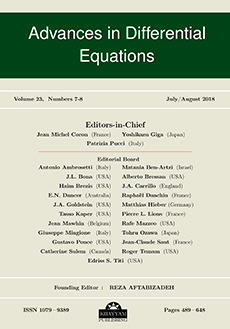Abstract
Let $D:=\{(x,y);\ x^2+y^2<1\}\subset\mathbb R^2$ and let $f\in C^2$. We study sign-changing solutions to $$ \Delta u+\lambda f(u)=0\ \ \textrm{in}\ \ D,\quad u=0\ \ \textrm{on}\ \ \partial D $$ under the conditions $f(0)=0$ and $f'(0)=1$ from the viewpoint of bifurcation theory. We show that this problem has infinitely many bifurcation points from which unbounded continua of sign-changing solutions emanate, where the eigenfunctions corresponding to each bifurcation point are nonradially symmetric. When $f(u)$ is of Allen-Cahn type (e.g., $f(u)=u-u^3$), then we show that the maximal continuum emanating from the second eigenvalue is homeomorphic to $\mathbb R\times S^1$. It is well-known that each eigenvalue is a bifurcation point. We show that the closure of the maximal continuum emanating from each bifurcation point is locally homeomorphic to a curve or disk.
Citation
Yasuhito Miyamoto. "Global branches of sign-changing solutions to a semilinear Dirichlet problem in a disk." Adv. Differential Equations 16 (7/8) 747 - 773, July/August 2011. https://doi.org/10.57262/ade/1355703205
Information





